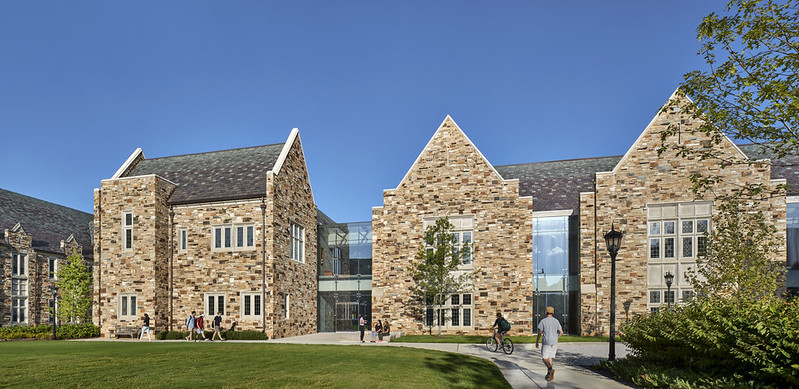
Accessibility Best Practices
Syllabus Access Statement
Include an accommodations statement in your syllabus inviting students to discuss their access needs with you. This will also help prompt students to share their course accessibility letters in a timely manner. Below is a sample statement.
- Access and Accommodations: Rhodes College is committed to creating inclusive, equitable, and accessible learning environments for all students. If you anticipate or experience barriers to learning in this course, please discuss your concerns with me. If you have a disability, you can work with Student Accessibility Services (SAS) to request academic accommodations. Reasonable accommodations are established through an interactive process between you, SAS, and your faculty. For more information, contact SAS@rhodes.edu. If you have already been approved for accommodations through SAS, please share your course accessibility letter and meet with me as soon as possible so we can develop an implementation plan together.
Ally Resource on Canvas
Ally is a Universal Design assistive technology tool embedded in Canvas that makes the digital learning environment more inclusive and accessible for all students. Ally automatically generates accessible alternative formats (e.g., audio, OCR'd PDF, ePUB, mobile-friendly, Immersive Reader, digital braille, etc.) without modifying your original materials. Ally also provides feedback on the accessibility of your course materials and guidance on how to fix certain issues.
- Upload your digital course materials to Canvas to allow all students immediate access to preferred alternative formats.
- View Ally's feedback on your materials to identify and fix access issues over time. For additional guidance, view the Content Remediation Guide for Faculty.
Accessible Course Content
Provide accessible content from the beginning so that no learner experiences delayed access while your materials are remediated after the fact. Accessible content benefits all students.
- Upload your digital course materials to Canvas so students can immediately access alternative formats using Ally.
- Plan early and choose required readings that are already available in alternative accessible formats (e.g., Word, ePUB text, OCR'd PDF) that can be used with assistive technology (e.g., text-to-speech software, etc.).
- Select videos that are already equipped with captions and audio descriptions.
- Use Microsoft 365 resources such as the Microsoft Accessibility Checker to ensure accessibility of your content (e.g., Word, PowerPoint, Excel). Additional resources include Ally and Adobe Acrobat Pro.
Academic Accommodations
Faculty AIM Portal
- Log in to the Faculty SAS Portal to view requested academic accommodations for each course. Note: You will only be able to view accommodation details for students who requested in AIM to use their approved accommodations in your course.
- This portal will also be used to manage specific accommodations (e.g., Intermittent Flex Plan).
Course Accessibility Letters
- Students with approved academic accommodations are responsible for completing the following steps at the beginning of each semester or once approved during the semester.
- Request new faculty course accessibility letters each semester through the Student SAS Portal. Once requested by the student, AIM (the SAS data management system) sends faculty a customized letter outlining approved accommodation details for each student.
- Meet with individual faculty to discuss their access needs and accommodation details. For test accommodations, SAS advises students to (1) meet at a scheduled time or during office hours, (2) provide at least two weeks' advanced notice, and (3) clarify a plan for test days (e.g., start-stop times, location) that does NOT impact attendance in another course.
- Accommodations are not retroactive. When students are uncertain of their need for accommodation in a course, SAS advises them that it is better to have the accommodations in place than to rush at the last minute. Faculty are not responsible for providing accommodations before the receipt of a course accessibility letter.
Testing Room
- The Testing Room (303 Barret Library) is an optional non-proctored, distraction-limited testing space accessible by fob only to Rhodes students with approved test accommodations through SAS.
- Faculty choosing to use the Testing Room in the provision of approved test accommodations should review the Testing Room Procedures and the Test Cover Sheet on the Testing Room website.
Universal Design in Education
Universal design refers to creating environments, products, and systems that can be accessed, understood, and used by all individuals, regardless of age, ability, or status. The concept of universal design originated in architecture and has since expanded to cover most areas. Designing accessible learning environments is essential for ensuring inclusive and equitable academic experiences for all students. Doing so requires proactively planning for the needs of as many diverse learners as possible, not just those of the "average" learner.
The DO-IT (Disabilities, Opportunities, Internetworking, and Technology) Center at the University of Washington created The Center for Universal Design in Education to promote resources for applying universal design to all aspects of the educational experience.
- Universal Design of Instruction
- Universal Design of Technology
- Universal Design of Physical Spaces
- Universal Design of Projects, Conference Exhibits, Presentations, and Professional Organizations
When planning events, Rhodes community members are encouraged to use the Best Practices: Accessible & Inclusive Events Checklist.
Contact SAS@rhodes.edu for consultation and additional resources.